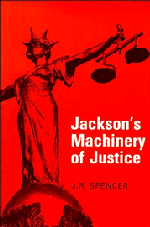Book contents
- Frontmatter
- Contents
- Acknowledgements
- List of figures
- List of tables
- Preface
- Preface to the first edition of ‘The Machinery of Justice in England’
- Abbreviations
- I Historical introduction
- II Civil jurisdiction
- III Tribunals
- IV Criminal jurisdiction
- V The personnel of the law
- 27 Solicitors
- 28 Barristers
- 29 Legal education
- 30 Should the profession continue to be divided into barristers and solicitors?
- 31 Judges
- 32 Juries
- 33 Lay justices and stipendiary magistrates
- 34 The administration of the courts
- VI The European dimension
- VII The cost of the law
- VIII Law Reform
- Appendix A The Report of the Civil Justice Review
- Table of Cases cited
- Table of Statutes cited
- Table of Stationery Office publications cited
- Index
31 - Judges
Published online by Cambridge University Press: 10 January 2011
- Frontmatter
- Contents
- Acknowledgements
- List of figures
- List of tables
- Preface
- Preface to the first edition of ‘The Machinery of Justice in England’
- Abbreviations
- I Historical introduction
- II Civil jurisdiction
- III Tribunals
- IV Criminal jurisdiction
- V The personnel of the law
- 27 Solicitors
- 28 Barristers
- 29 Legal education
- 30 Should the profession continue to be divided into barristers and solicitors?
- 31 Judges
- 32 Juries
- 33 Lay justices and stipendiary magistrates
- 34 The administration of the courts
- VI The European dimension
- VII The cost of the law
- VIII Law Reform
- Appendix A The Report of the Civil Justice Review
- Table of Cases cited
- Table of Statutes cited
- Table of Stationery Office publications cited
- Index
Summary
By long usage, the expression ‘the superior judges’ or simply ‘the judges’ usually means the judges of the High Court, Court of Appeal and the Law Lords. It is these judges who are the centre of interest when we think of ‘the courts’, the development of the law and the administration of justice. For many years there have been other judges. Before 1971 there were county court judges, the Chancellors of the Chancery Courts of Lancaster and Durham, the Recorder and Common Serjeant of the City of London, Recorders of boroughs and a number of legal chairmen of Quarter Sessions, together with deputy recorders and deputy chairmen, but they were not regarded as forming a corps of lower-tier judges. There was a system of county courts, but other courts below the level of the High Court were fragmented and largely governed by piece-meal legislation. The Courts Act 1971 not only restructured the courts but also rationalised the lower judiciary (see chapter 19(i) above). There is now a single rank of full-time lesser judges, namely Circuit Judges, taking civil and criminal work, supplemented by new-style Recorders who are part-time professional judges. The qualifications for appointment were discussed in the last section.
In the years before the Second World War a serious problem was insufficient judicial strength.
- Type
- Chapter
- Information
- Jackson's Machinery of Justice , pp. 362 - 381Publisher: Cambridge University PressPrint publication year: 1989

